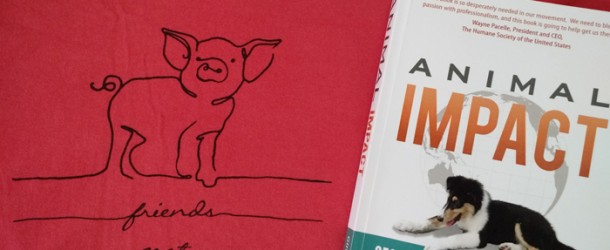At a recent Vegan Food Chat on Twitter hosted by The Food Duo, the topic was Vegan Writing in the Mainstream, and the guest was Grant Butler, a writer for The Oregonion. The chat included interesting comments about effective animal activism, and I was prompted to self-reflect on my own attitudes about and involvement with animal advocacy.
Unlike some vegans who have one primary motivation that initiates their transition to a vegan lifestyle, such as the so-called “health vegans” or “ethical vegans,” I had multiple reasons from the start. As a pharmacist and a serious student (and now teacher) of yoga, both health and spiritual/ethical reasons have been equally compelling for me from the beginning.
However, I think I am typical in that as time goes by, the ethical reasons and concern for the well-being of animals become ever more paramount. I do believe that consuming a purely vegan diet affects us spiritually and increases our deeply felt awareness of the interconnectedness of all beings. This realization makes awareness of the ongoing cruelty to animals more painful than ever.
For these reasons, animal activism is something to which I am giving more thought. Up until now, I mostly have felt that the act of living as a happy, healthy, vegan is the most effective way for me to be a force for positive change. The idea of attraction rather than promotion, as espoused by 12-step groups, seemed to provide adequate support for this notion.
Other influences also have caused me to be hesitant to be more involved in animal activism. For example, in a talk at a Farms 2 Forks event I attended in Atlanta a couple of years ago, Dr. Doug Lisle (coauthor of The Pleasure Trap) talked about the psychology of change and how it’s threatening and ineffective to come off to others as a know-it-all or like we have all the answers. Dr. Lisle suggested being self-effacing, acting like you’re just trying this, are unsure of the whole thing, and recognize that it might not be for everyone.
Another example, only peripherally related, involves something I read in a book about relationships (Marriage Rules: A Manual for the Married and the Coupled Up by Dr. Harriet Lerner). In this book, a basic principle suggested for getting along well was not to “operate as if we have the truth of the universe.” Although this referred to marriage in particular, it was suggested, and logically follows, that relationships in general are likely to suffer from us having this attitude. However, I probably am not alone as a vegan when I admit that I do think I have found a “truth of the universe,” and the thought of trying to convince those who don’t agree can seem daunting.
The advice of these experts can seem quite contrary to the endeavors of animal activism. A combination of my hesitancy, as an introvert, to speak up and make noise, along with rationalizations thanks to the aforementioned expert advice, has for the most part stymied any activist actions on my part other than living a vegan life, sharing vegan food, enthusiastically answering questions from interested parties, and signing online petitions.
My usual approach to learning about new things is to read about them, and fortunately, there is a wealth of useful information about effective animal advocacy. One incredibly comprehensive resource list on the topic can be found at the In Defense of Animals web site. Bruce Friedrich’s article, “Effective Advocacy: Stealing from the Corporate Playbook,” is a short but very helpful read, providing doable suggestions such as wearing buttons or T-shirts saying “Ask me why I’m a vegetarian” and always having pamphlets on hand, such as “Compassionate Choices” by Vegan Outreach.
 I also have begun reading the book Animal Impact: Secrets Proven to Achieve Results and Move the World by Caryn Ginsberg. The book has numerous examples of effective advocacy campaigns and many concrete suggestions for increasing the impact of advocacy efforts. So far though, the aspect of the book that impressed me most was the way it helped me to better understand how it is possible that not everyone “gets it” right away that cruelty to animals is wrong and that immediately changing our lifestyles to stop supporting this cruelty is necessary and possible. This was accomplished through examples of compelling arguments about other issues.
I also have begun reading the book Animal Impact: Secrets Proven to Achieve Results and Move the World by Caryn Ginsberg. The book has numerous examples of effective advocacy campaigns and many concrete suggestions for increasing the impact of advocacy efforts. So far though, the aspect of the book that impressed me most was the way it helped me to better understand how it is possible that not everyone “gets it” right away that cruelty to animals is wrong and that immediately changing our lifestyles to stop supporting this cruelty is necessary and possible. This was accomplished through examples of compelling arguments about other issues.
One example was shopping at malls or large retailers, where goods may have been produced by workers in poor and unsafe conditions and then transported long distances with the associated environmental impact. This example, and the realization that I was not immediately ready to change completely to buying all my clothing and appliances second-hand, helped bring home the realization that as a vegan, I have not cornered the market on moral and ethical living. Although I believe strongly in being vegan and will continue to do all I can to help animals, I have to realize that ethics are complex and that I have a lot to learn from others about areas where they may be causing less harm than I am. And, the most important thing I can do is try to be respectful and compassionate toward all beings, even people whose opinions and choices are different from mine.
What ways have you found to become involved in animal activism? Do you have any favorite resources or charitable organizations?
